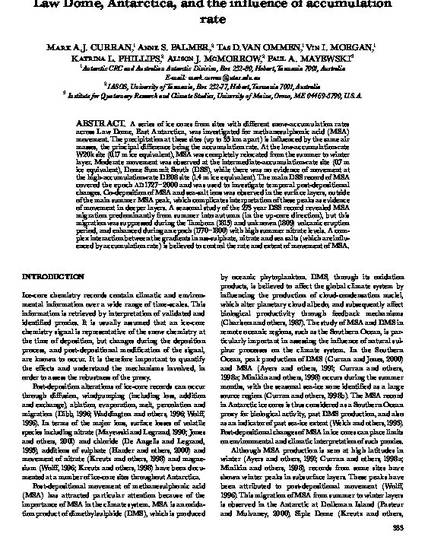
Article
Post-Depositional Movement of Methanesulphonic Acid at Law Dome, Antarctica, and the Influence of Accumulation Rate
Annals of Glaciology
Document Type
Conference Proceeding
Rights and Access Note
This Item is protected by copyright and/or related rights. You are free to use this Item in any way that is permitted by the copyright and related rights legislation that applies to your use. In addition, no permission is required from the rights-holder(s) for educational uses. For other uses, you need to obtain permission from the rights-holder(s).
Publication Date
1-1-2002
Disciplines
Abstract/ Summary
A series of ice cores from sites with different snow-accumulation rates across Law Dome, East Antarctica, was investigated for methanesulphonic acid (MSA) movement. The precipitation at these sites (up to 35 km apart) is influenced by the same air masses, the principal difference being the accumulation rate. At the low-accumulation-rate W20k site (0.17 in ice equivalent), MSA was completely relocated from the summer to winter layer. Moderate movement was observed at the intermediate-accumulation-rate site (0.7 in ice equivalent), Dome Summit South (DSS), while there was no evidence of movement at the high-accumulation-rate DE08 site (1.4 in ice equivalent). The main DSS record of MSA covered the epoch AD 1727-2000 and was used to investigate temporal post-depositional changes. Co-deposition of MSA and sea-salt ions was observed of the surface layers, outside of the main summer MSA peak, which complicates interpretation of these peaks as evidence of movement in deeper layers. A seasonal study of the 273 year DSS record revealed MSA migration predominantly from summer into autumn (in the up-core direction), but this migration was suppressed during the Tambora (1815) and unknown (1809) volcanic eruption period, and enhanced during an epoch (1770-1800) with high summer nitrate levels. A complex interaction between the gradients in nss-sulphate, nitrate and sea salts (which are influenced by accumulation rate) is believed to control the rate and extent of movement of MSA.
Citation/Publisher Attribution
Curran, MAJ, Palmer, AS, Van Ommen, TD, Morgan, VI, Phillips, K, McMorrow, AJ, and Mayewski, PA, 2002, Post-Depositional Movement of Methanesulphonic Acid at Law Dome, Antarctica, and the Influence of Accumulation Rate: Annals of Glaciology, Vol 35, v. 35, p. 333-339. Available on publisher's site at: http://www.ingentaconnect.com/content/igsoc/agl/2002/00000035/00000001/art00055
Publisher Statement
© Copyright 2002 by the International Glaciological Society
DOI
10.3189/172756402781816528
Version
publisher's version of the published document
Citation Information
Mark A.J. Curran, Anne S. Palmer, Tas D. Van Ommen, Vin I. Morgan, et al.. "Post-Depositional Movement of Methanesulphonic Acid at Law Dome, Antarctica, and the Influence of Accumulation Rate" Annals of Glaciology Vol. 35 (2002) p. 333 - 339 Available at: http://works.bepress.com/paul_mayewski/44/
